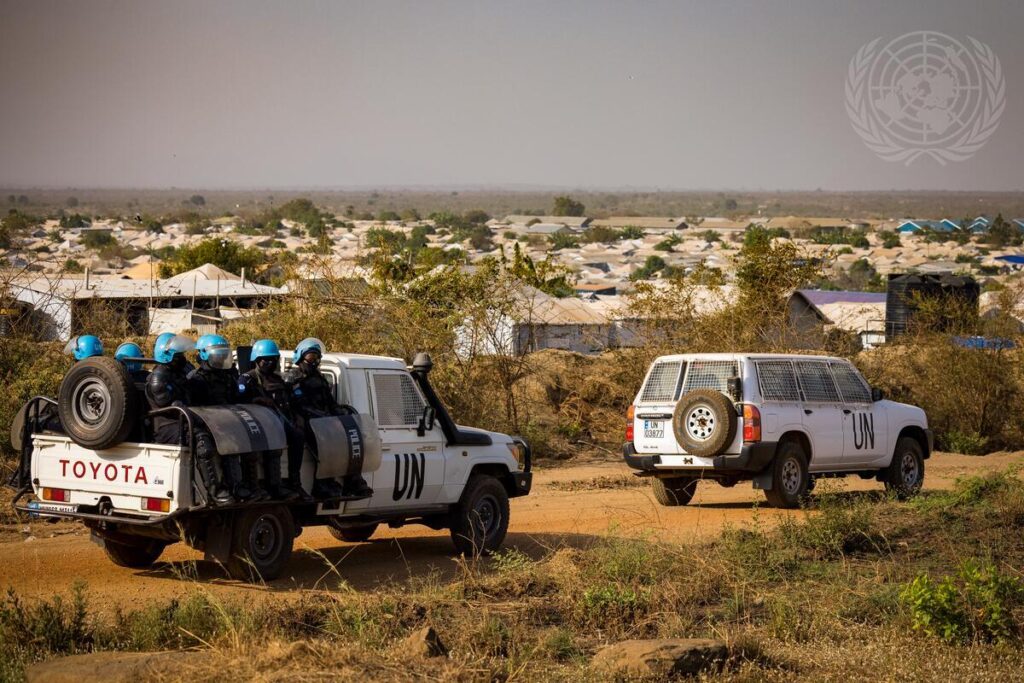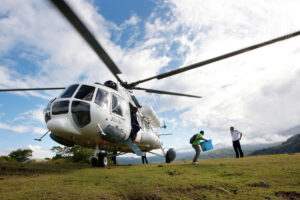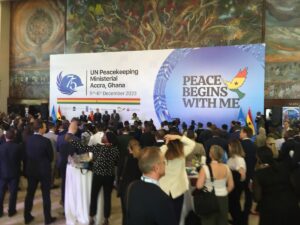Introduction
The UN Security Council is expected to renew the mandate of the United Nations Mission in South Sudan (UNMISS) in March 2024.1UN Security Council Resolution 2677 (March 15, 2023), UN Doc. S/RES/2677. As of February 29, 2024, there was a proposal to adopt a technical rollover of the mandate until April 30, 2024, to allow time to consider additional briefings and reports, as well as an assessment of progress on election preparations. The upcoming negotiations among council members will unfold as South Sudan prepares to hold national elections in December 2024. Intercommunal violence remains pervasive across the country, particularly in hotspot areas in the Abyei region and Jonglei, Lakes, Unity, and Warrap states. Significant humanitarian concerns, further aggravated by the ongoing conflict in Sudan, pose multifaceted threats to civilians, and the limited presence of state institutions to provide basic services or security amplifies the magnitude of the challenges confronting South Sudan. The humanitarian situation is further exacerbated by the impact of climate change and the influx of refugees and returnees fleeing the conflict in Sudan.
In this context, the International Peace Institute (IPI), the Stimson Center, and Security Council Report cohosted a roundtable discussion on February 6, 2024, to discuss UNMISS’s mandate renewal. This roundtable offered a platform for member-state representatives, UN officials, civil society stakeholders, and independent experts to share their assessments of the situation in South Sudan in a candid and collaborative manner. The discussion was intended to help the Security Council make more informed decisions on prioritizing and sequencing UNMISS’s mandate, as well as the mission’s strategic orientation and actions on the ground.
Participants largely agreed that the Security Council’s three-year strategic vision (2021–2024) for UNMISS, in addition to the mandate’s structure and four key priorities, are still valid in light of the current context in the country.2UNMISS was mandated to carry out tasks on four priority areas in 2023: protection of civilians; creating conditions conducive to the delivery of humanitarian assistance; supporting the implementation of the Revitalized Agreement on the Resolution of the Conflict in South Sudan (R-ARCSS); and monitoring, investigating, and reporting on violations of humanitarian and human rights law. See: UN Doc. S/RES/2677. The dialogue focused on identifying ways to further refine the mandate and ensure that UNMISS has both the direction and flexibility needed to support South Sudan as it prepares for elections and completes outstanding tasks related to the political transition. Elements of this transition that are still outstanding, including the drafting of the constitution, details on elections, and transitional security arrangements, were key points of discussion. Many noted that the ongoing uncertainty on these points limited understanding of the kind of support needed from various partners, including UNMISS.
Participants urged council members to consider the following issues in mandate renewal discussions on UNMISS.
- Calling for the full implementation of the 2018 peace agreement (R-ARCSS) without delay, with immediate priorities to include drafting a permanent constitution, determining the type of elections to be held in December 2024, and developing a plan for election security in consultation with UNMISS, as well as forming and deploying the Necessary Unified Forces (NUF) to provide security during the elections;
- Emphasizing the importance of implementing Chapter V of the R-ARCSS to enhance transitional justice and accountability, including through the establishment of the Hybrid Court;
- Reaffirming the four main pillars of UNMISS’s mandate, with the protection of civilians (POC) to remain a top priority, and ensuring that UNMISS has the flexibility, capacity, and resources to swiftly adjust to evolving security circumstances;
- Strengthening national capacity and reinforcing UNMISS’s protection mechanisms and support for women at risk of and who have been victims of sexual and gender-based violence, particularly leading up to the elections;
- Requesting that UNMISS monitor and report on the state of civic space and continue promoting inclusive political dialogue and civic engagement, including but not limited to the participation of women; and
- Encouraging international partners to scale up technical assistance, capacity building, and financial support to South Sudan during this critical period of the transition, both to national institutions and civil society organizations.
Supporting the Peace Process and Political Transition
Progress on the political transition, outlined in the 2018 Revitalized Agreement on the Resolution of the Conflict in South Sudan (R-ARCSS) and the 2022 Roadmap to a Peaceful and Democratic End of the Political Transition, has been exceedingly slow. Speakers emphasized that it is the primary responsibility of the transitional government to implement these agreements. A sign of progress is the recent organization and approval of budgets for the National Elections Commission, Political Parties Council, and National Constitutional Review Commission.
While participants recognized the technical support requested by the government, several participants highlighted the government’s continued inaction in making key decisions related to the elections process. To meet the December 2024 electoral timeline, the Sudan People’s Liberation Movement (SPLM) and the Sudan People’s Liberation Movement-in-Opposition (SPLM-IO) must reach consensus on the path forward. Immediate action must be taken to draft and finalize the permanent constitution, decide on the nature and type of elections (e.g., national [presidential or parliamentary], state, and local), finalize the implementation of the transitional security arrangements, and create a national plan for election security. Time is of the essence, as in April 2024, the UN plans to informally assess the country’s ability to carry out elections by the end of the year and determine what type of assistance UNMISS could provide in support.
Participants expressed concerns that these delays in election preparations make it difficult for partners to plan for and tailor their support. Participants highlighted that if the major outstanding questions are not addressed by then, there is a lower chance of holding fair, free, and peaceful elections. They also emphasized that due to the absence of an agreement on the elections between the government and opposition groups, UNMISS can play a role in bringing together stakeholders to facilitate inclusive political dialogue.
The risk of civic space shrinking further in the lead-up to elections remains a concern. One participant recommended that UNMISS put enhanced emphasis on reporting changes within South Sudan’s civic environment and undertake more civic education initiatives, such as sharing information about bills that have been passed. The imperative to include women in the political process and in government was also highlighted, particularly as the 35 percent quota remains unmet in the newly reconstituted National Elections Commission and National Constitutional Review Commission.3UN Security Council, Situation in South Sudan: Report of the Secretary-General, UN Doc. S/2023/976, December 12, 2023, para. 13. One participant voiced that women civil society organizations in the country could benefit from further training and resources to promote gender-sensitivity in politics and raise awareness of ongoing gender-based violence around the country.
Participants also identified the spread of hate speech as a risk in the coming months, particularly as it could fuel further violence. To monitor and address hate speech, as well as mis- and disinformation, UNMISS is employing various strategies, including conducting perception surveys, and consulting with communities where the mission maintains a physical presence, and sharing information over the radio. Furthermore, participants voiced the need for capacity-building initiatives for journalists, lawyers, and investigators to help them accurately document and report on human rights violations and promote peace and stability during the electoral period.
Participants noted that while the ongoing conflict in Sudan has not yet had a major direct impact on the security dynamics in South Sudan, it has impacted cross-border trade and put immense humanitarian pressure on the country. Approximately 520,000 refugees and returnees have crossed into South Sudan since the outbreak of the conflict in April 2023. This could raise tensions with host communities over resources and exacerbate existing economic and climate-related vulnerabilities.
The relapse of intercommunal violence in the Abyei region and attacks against troops deployed to the UN Interim Security Force for Abyei (UNISFA) have added another layer of insecurity, with frequent clashes between Ngok Dinka and Twic Dinka communities spilling over into Warrap state. Further, the conflict in Sudan has halted all talks between Sudan and South Sudan on the future status of Abyei. Although South Sudan plans to allow communities in Abyei to participate in the elections, the security situation will make it challenging for them to participate and to receive necessary information on developments around the election.4Ibid., para. 11.
In the context of increased fragility at the local, national, and regional levels, participants underlined that the arms embargo imposed on South Sudan has curtailed the government’s ability to fulfill its responsibility to protect civilians from armed groups. However, the embargo has also limited the flow of weapons that could further exacerbate violence in a situation already marked by intercommunal conflict. At the same time, the proliferation and flow of illicit arms, particularly in the Abyei region, threatens to place more arms in the hands of non-state actors.
Participants also noted that the UN and the international community’s focus on other crises, including the ongoing Russia-Ukraine war and the war in Gaza, has diverted attention from the situation in South Sudan. There was, however, recognition of the efforts of the Intergovernmental Authority on Development (IGAD) and the Troika to monitor and support the transition process. Furthermore, the good offices employed by the trilateral mechanism (consisting of the African Union or AU, IGAD, and the UN) remain vital to supporting the transition process. The briefing delivered by the trilateral mechanism, alongside the Reconstituted Joint Monitoring and Evaluation Commission (RJMEC), to the AU Peace and Security Council (AUPSC) in November 2023 was important in promoting policy coherence and convergence between the AUPSC and the Security Council to support the country’s transition.5African Union, Communiqué of the 1186th Meeting of the Peace and Security Council, AU Doc. PSC/PR/COMM.1186, November 16, 2023.
As one speaker noted, conflict and insecurity have plagued Sudan and South Sudan for decades. Consequently, South Sudan has been in a mode of continuous crisis management since independence. This has affected the development of the country and its institutions, and it continues to have a daily impact on the people of South Sudan. Efforts to support the political process and address insecurity must continue to draw on this wider historical understanding.
Protection of Civilians
The protection of civilians (POC) remains an overarching priority for the mission, cutting across all components, and the mission’s work on POC has made notable contributions to civilian safety and security. The independent assessment report requested by the Security Council reaffirms the approach UNMISS has undertaken through its POC strategy.6UN Security Council, Letter Dated 4 December 2023 from the Secretary-General Addressed to the President of the Security Council, UN Doc. S/2023/955, December 6, 2023. Going forward, the mission will need to focus on implementing the report’s recommendations. Participants also noted that UNMISS may need to tailor and adapt its POC efforts given the heightened risks of electoral violence and a possible surge in intercommunal violence in the coming months. This could include bolstering early warning and prevention, continuing to prioritize the agility of uniformed components (e.g., by setting up more temporary operating bases and establishing smaller camps in potential hotspot areas), and engaging local leaders in promoting peace and implementing appropriate security arrangements. The mission, however, faces ongoing limitations to its physical protection capacity, requiring careful management of expectations among national and local stakeholders.
Some participants underscored the impact of ongoing conflict-related sexual violence and gender-based violence. They also noted the likelihood of a spike in violence ahead of the elections, including the potential targeting of women engaged in the political process. In this context, UNMISS can work toward strengthening monitoring and reporting mechanisms on sexual and gender-based violence and making them more accessible to survivors, as well as supporting efforts to hold perpetrators accountable. Participants also noted the need to connect survivors with mental health support and other services to assist them in recovering and healing from trauma.
Several participants highlighted that prescriptive POC language should be avoided in the mandate, allowing the mission greater flexibility in how it responds to emerging and diverse scenarios. For example, UNMISS has identified six hotspots across the country where violence influenced by communal dynamics is tied to political elites in Juba. The mission is engaging with local government, local leaders, and community members in these areas to mitigate and prevent violence.
The government’s primary responsibility to protect civilians and address systemic fragility was also underlined. However, participants recognized that the capacity of national security forces to protect civilians remains limited, necessitating a continued focus on building the capacity of the South Sudanese police and the ongoing graduation of the unified forces. Participants also confirmed that the mission currently has no plans to transfer responsibility for the Malakal POC site to the government due to ongoing insecurity in the area. It was indicated that any future redesignation of this site would primarily be guided by the needs and desires of local communities. The mission will thus continue to monitor the situation and protect the civilians in this site.
Accountability and Transitional Justice
One participant underscored the importance of operationalizing Chapter V of the R-ARCSS regarding accountability and transitional justice and referenced the ongoing delay of the establishment of the Hybrid Court.7As per the report of the Panel of Experts on South Sudan, the delay in establishing the Hybrid Court is attributed to a lack of initiative on the part of the African Union and the Government of South Sudan. UN Security Council, Final Report of the Panel of Experts on South Sudan Submitted Pursuant to Resolution 2633 (2022), UN Doc. S/2023/294, April 26, 2023, para. 15. On the other hand, some urged more focus on the reconciliation and healing of the civilian population, considering the impracticality of expecting a government that has been involved in the conflict to assess itself and administer justice. Overall, it was made clear that South Sudan’s judicial system requires greater technical assistance and capacity building to address and prevent sexual and gender-based violence, including cases of rape, effectively and appropriately.
Emerging Issues
The upcoming mandate renewal also presents the opportunity to reflect on two additional themes: planning and preparation for the mission transition and climate change. Participants raised the issue of mission transition given developments last year in Mali, the Democratic Republic of the Congo, and Sudan, which may provide lessons for UNMISS’s eventual transition. While the Security Council will make the determination on the eventual exit of UNMISS, the mission is working with the UN country team to develop a transition strategy and assesses the broader UN presence in South Sudan.
Additionally, climate change continues to exacerbate vulnerabilities and fuel intercommunal competition over resources. Considering the effects of climate change on the security context and the mandate of the mission, UNMISS may need additional capacity to engage on climate-related issues and strengthened language in its mandate.
Conclusion
UNMISS continues to play a key role in supporting South Sudan’s political transition and in assisting with election preparations. The past year of UNMISS’s mandate cycle has proven challenging due to continued delays in achieving key milestones in the R-ARCSS, increased pressure on humanitarian assistance, and ongoing risks to the safety and security of civilians, exacerbated by climate change, the conflict in Sudan, instability in the Abyei region, and intercommunal violence across the country.
Participants agreed that the four-pillar mandate remains valid in positioning the mission’s support to the country and called for the South Sudanese government to urgently complete the remaining tasks for the transitional period. The upcoming months will be critical for the government to demonstrate its political will and leadership by making tangible progress toward political and institutional milestones, as outlined in the R-ARCSS, and thus enabling UNMISS to implement its mandate. The dynamics around the election and related emerging developments are expected to shape the mandate renewal.
Photo caption: UN Police on patrol in the external area of the internally displaced persons (IDP) Camp Number 3 in Juba, South Sudan. Credit: UN Photo/Gregório Cunha.
Notes
- 1UN Security Council Resolution 2677 (March 15, 2023), UN Doc. S/RES/2677. As of February 29, 2024, there was a proposal to adopt a technical rollover of the mandate until April 30, 2024, to allow time to consider additional briefings and reports, as well as an assessment of progress on election preparations.
- 2UNMISS was mandated to carry out tasks on four priority areas in 2023: protection of civilians; creating conditions conducive to the delivery of humanitarian assistance; supporting the implementation of the Revitalized Agreement on the Resolution of the Conflict in South Sudan (R-ARCSS); and monitoring, investigating, and reporting on violations of humanitarian and human rights law. See: UN Doc. S/RES/2677.
- 3UN Security Council, Situation in South Sudan: Report of the Secretary-General, UN Doc. S/2023/976, December 12, 2023, para. 13.
- 4Ibid., para. 11.
- 5African Union, Communiqué of the 1186th Meeting of the Peace and Security Council, AU Doc. PSC/PR/COMM.1186, November 16, 2023.
- 6UN Security Council, Letter Dated 4 December 2023 from the Secretary-General Addressed to the President of the Security Council, UN Doc. S/2023/955, December 6, 2023.
- 7As per the report of the Panel of Experts on South Sudan, the delay in establishing the Hybrid Court is attributed to a lack of initiative on the part of the African Union and the Government of South Sudan. UN Security Council, Final Report of the Panel of Experts on South Sudan Submitted Pursuant to Resolution 2633 (2022), UN Doc. S/2023/294, April 26, 2023, para. 15.




